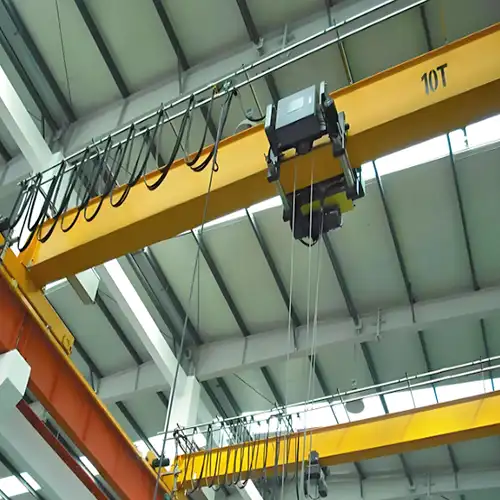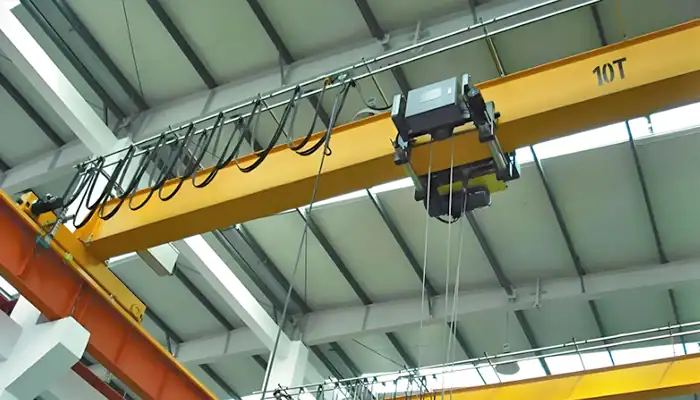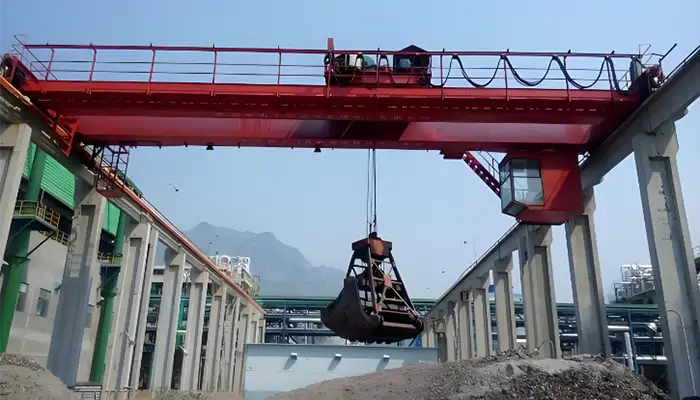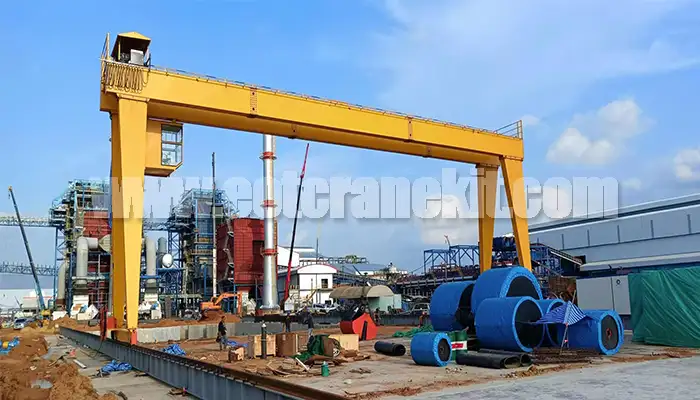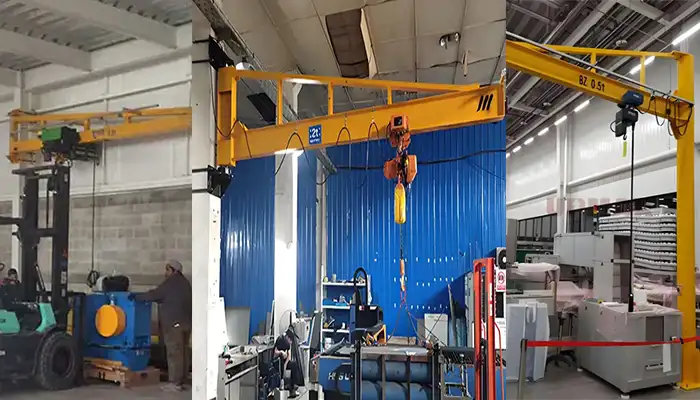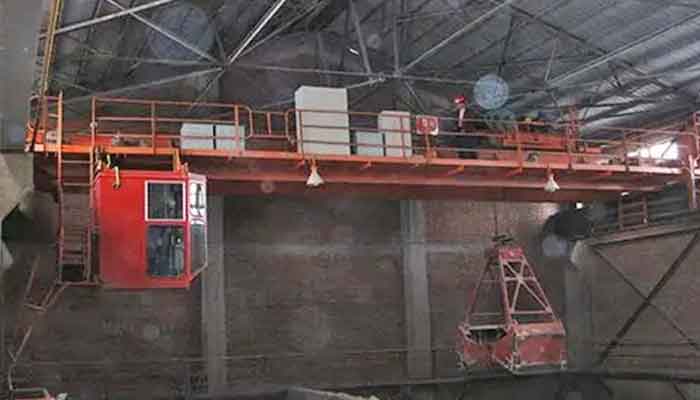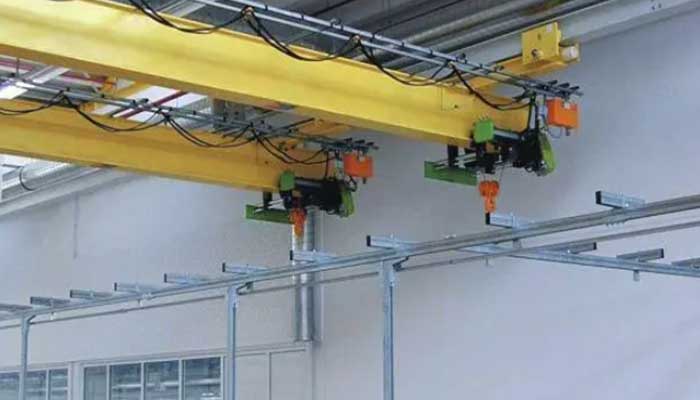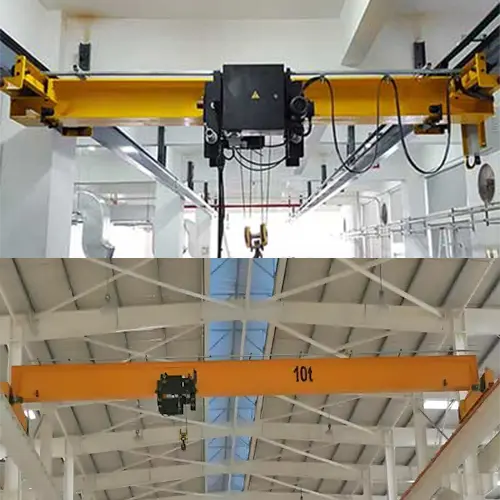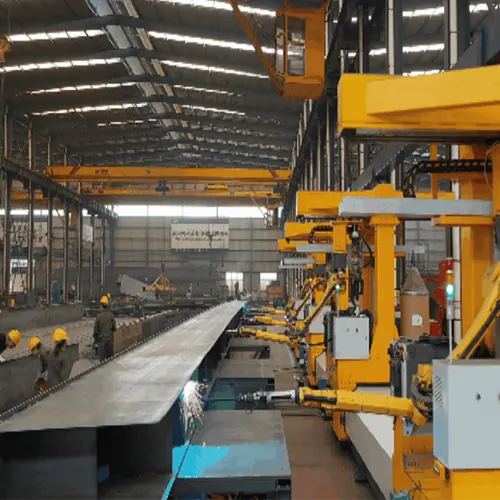Negotiating Prices with 10 Ton Overhead Crane Dealers
Learn strategies for negotiating prices with 10-ton overhead crane dealers to secure the best deals while ensuring quality & reliability.Get your 10 ton crane!
Category: 10 Ton Overhead Crane
Learn strategies for negotiating prices with 10-ton overhead crane dealers to secure the best deals while ensuring quality & reliability.Get your 10 ton crane!
Your Trusted Overhead Crane Manufacturer & Supplier
Negotiating Prices with 10 Ton Overhead Crane Dealers
The 10 Ton Overhead Crane market is a vital component of various industries, including construction, manufacturing, and logistics. These cranes play a crucial role in lifting and transporting heavy loads with precision and efficiency. As businesses increasingly rely on these machines to streamline their operations, the demand for quality overhead cranes continues to rise.
Distributors and dealers act as the bridge between manufacturers and end-users in the 10 Ton Overhead Crane market. They play a pivotal role in ensuring a smooth supply chain, from production to delivery. These intermediaries offer valuable services such as product sourcing, distribution, installation, and after-sales support, making them indispensable partners for buyers seeking reliable solutions.
Price negotiation is a critical aspect of purchasing 10 Ton Overhead Cranes. As buyers aim to maximize value while minimizing costs, effective negotiation skills become paramount. Negotiating the best price not only helps in securing a budget-friendly deal but also ensures that buyers get the most out of their investment in terms of quality and service.
Role of Distributors and Dealers
Distributors and dealers serve as intermediaries between manufacturers and end-users in the crane market. While distributors procure cranes directly from manufacturers and distribute them to dealers or end-users, dealers act as retailers who sell cranes directly to customers. Their roles encompass various tasks, including product sourcing, inventory management, marketing, sales, and customer support.
In the 10-ton overhead crane market, distributors and dealers play crucial roles as intermediaries between manufacturers and end-users. Understanding their roles is essential for navigating the procurement process effectively. Here's a detailed look at the functions and responsibilities of distributors and dealers:
- Product Sourcing: Distributors are responsible for sourcing 10-ton overhead cranes directly from manufacturers. They establish partnerships with manufacturers to procure cranes in bulk, ensuring a steady supply of products to meet market demand. Dealers, on the other hand, may source cranes from distributors or directly from manufacturers, depending on their business model and relationships within the industry.
- Inventory Management: Distributors manage inventory levels to ensure adequate stock availability for dealers and end-users. They maintain warehouses or distribution centers where cranes are stored before being distributed to dealers or shipped directly to customers. Dealers also manage inventory to maintain stock levels based on market demand and customer preferences, ensuring timely delivery of cranes to end-users.
- Marketing and Promotion: Distributors and dealers engage in marketing and promotional activities to create awareness and generate demand for 10-ton overhead cranes. Distributors may collaborate with manufacturers to develop marketing materials, participate in trade shows, and advertise products to attract dealers and end-users. Dealers utilize various marketing channels, such as online platforms, print media, and industry events, to showcase cranes, highlight features, and attract potential customers.
- Sales and Distribution: Distributors and dealers are responsible for selling 10-ton overhead cranes to end-users. Distributors may sell cranes to dealers at wholesale prices, allowing dealers to mark up the prices and sell them to customers at retail prices. Alternatively, distributors may sell cranes directly to large end-users or project contractors, bypassing dealers. Dealers handle sales transactions with end-users, providing product information, negotiating prices, and facilitating the purchase process.
- Customer Support: Both distributors and dealers provide customer support services to ensure customer satisfaction and loyalty. Distributors offer support to dealers by providing product training, technical assistance, and after-sales support. Dealers offer pre-sales consultation, installation assistance, warranty services, and ongoing maintenance support to end-users, addressing any issues or concerns to enhance the overall customer experience.
In summary, distributors and dealers play complementary roles in the 10-ton overhead crane market, facilitating the efficient distribution, marketing, sales, and support of cranes to end-users. Their collaborative efforts ensure a seamless procurement process and contribute to the success of manufacturers, dealers, and end-users alike.
Importance of Their Role in the Supply Chain
The role of distributors and dealers is pivotal in ensuring a seamless supply chain for 10 Ton Overhead Cranes. They serve as key links in the distribution network, facilitating the flow of products from manufacturers to end-users. By leveraging their expertise and resources, distributors and dealers streamline procurement processes, optimize inventory management, and enhance the accessibility of cranes to buyers across diverse industries.
Distributors and dealers are essential components of the supply chain for 10-ton overhead cranes, playing pivotal roles in ensuring a seamless flow of products from manufacturers to end-users. Here's why their roles are crucial:
- Efficient Procurement Processes: Distributors and dealers streamline the procurement process by acting as intermediaries between manufacturers and end-users. They leverage their industry knowledge, market insights, and relationships with manufacturers to source high-quality cranes efficiently. By handling negotiations, order processing, and logistics, distributors and dealers simplify the procurement process for buyers, allowing them to focus on their core business operations.
- Optimized Inventory Management: Distributors and dealers play a critical role in inventory management, ensuring that the right products are available at the right time and in the right quantities. They maintain warehouses or distribution centers where cranes are stored, enabling quick access to inventory for timely fulfillment of orders. By implementing effective inventory management practices, such as demand forecasting, stock replenishment, and inventory tracking, distributors and dealers minimize stockouts, reduce excess inventory, and optimize warehouse operations.
- Enhanced Accessibility to Buyers: Distributors and dealers enhance the accessibility of 10-ton overhead cranes to buyers across diverse industries and geographic locations. Through their extensive network of distribution channels, sales outlets, and online platforms, they make cranes readily available to customers, regardless of their location or purchasing preferences. This accessibility ensures that buyers have access to a wide range of crane options, configurations, and specifications to meet their specific requirements.
- Expertise and Support: Distributors and dealers provide valuable expertise and support to buyers throughout the procurement process. They offer product recommendations, technical guidance, and assistance with customization to help buyers make informed decisions. Additionally, distributors and dealers offer after-sales support, including installation assistance, training, and maintenance services, to ensure the optimal performance and longevity of cranes. Their expertise and support contribute to a positive buying experience and customer satisfaction.
In summary, distributors and dealers play indispensable roles in the supply chain for 10-ton overhead cranes, facilitating efficient procurement processes, optimizing inventory management, enhancing accessibility to buyers, and providing valuable expertise and support. Their contributions ensure that buyers have access to high-quality cranes that meet their needs while streamlining the overall procurement experience.
Their Impact on Customer Experience and Satisfaction
Distributors and dealers play a significant role in shaping customer experience and satisfaction in the crane market. Through their expertise, product knowledge, and personalized service, they assist buyers in selecting the right crane model for their specific needs. Moreover, distributors and dealers offer valuable after-sales support, including installation assistance, maintenance services, and spare parts supply, ensuring optimal performance and longevity of the purchased cranes.
Distributors and dealers wield considerable influence over customer experience and satisfaction within the crane market. Here's how their roles positively impact buyers:
- Expertise and Product Knowledge: Distributors and dealers possess specialized knowledge about 10-ton overhead cranes, enabling them to guide buyers through the selection process. By understanding the unique requirements of various industries and applications, they offer tailored recommendations that align with the buyer's needs, budget, and operational environment. Their expertise helps buyers make informed decisions, leading to higher satisfaction with the purchased crane.
- Personalized Service: Distributors and dealers provide personalized service to buyers, offering individualized attention and support throughout the purchasing journey. Whether it's answering questions, addressing concerns, or providing product demonstrations, they ensure that buyers feel valued and supported at every stage of the process. This personalized approach fosters trust and confidence in the distributor or dealer, resulting in enhanced customer satisfaction.
- After-sales Support: Distributors and dealers offer comprehensive after-sales support to buyers, ensuring that they receive assistance beyond the point of purchase. This includes installation assistance to ensure proper setup and configuration of the crane, as well as ongoing maintenance services to keep the crane operating at peak performance. Additionally, distributors and dealers supply spare parts and accessories, facilitating quick repairs and minimizing downtime. By providing reliable after-sales support, they enhance the overall ownership experience and satisfaction of buyers.
- Customer Feedback and Improvement: Distributors and dealers serve as conduits for customer feedback, relaying valuable insights and suggestions to manufacturers for product improvement. By actively engaging with buyers and addressing their needs and concerns, they contribute to the continuous enhancement of crane offerings. Manufacturers can use this feedback to refine product features, enhance reliability, and improve overall customer satisfaction levels.
In summary, distributors and dealers have a profound impact on customer experience and satisfaction in the crane market. Through their expertise, personalized service, after-sales support, and role in facilitating customer feedback, they ensure that buyers receive the guidance, assistance, and care they need to make informed decisions and derive maximum value from their crane investment.
As we proceed, we will explore strategies for finding certified distributors, compare the advantages of dealer vs. direct purchases, and delve into effective price negotiation techniques. Join us as we navigate through the intricacies of the 10 Ton Overhead Crane market, empowering you to make informed purchasing decisions.
Finding Certified Distributors of 10 Ton Overhead Cranes
Ensuring that you are dealing with certified distributors is paramount when purchasing 10 Ton Overhead Cranes. In this section, we explore the significance of certification, effective strategies for identifying certified distributors, and reliable sources for locating them.
Importance of Certification in Crane Purchases
Certification serves as a mark of quality and compliance with industry standards in the crane market. When you buy from certified distributors, you can trust that the cranes meet rigorous safety, performance, and reliability criteri Certification also instills confidence in buyers, assuring them of the crane's suitability for their intended applications and adherence to regulatory requirements, thus minimizing risks and liabilities associated with non-compliant equipment.
Certification plays a pivotal role in ensuring the quality, safety, and reliability of cranes in the market. Here's why it's essential:
- Mark of Quality and Compliance: Certification serves as a testament to a crane's adherence to stringent industry standards and regulations. When purchasing from certified distributors, buyers can trust that the cranes meet established benchmarks for safety, performance, and reliability. This assurance is invaluable in guaranteeing the quality and integrity of the equipment.
- Confidence and Trust: Certification instills confidence in buyers, assuring them of the crane's suitability for their intended applications. By choosing certified cranes, buyers can trust that the equipment has undergone rigorous testing and validation to ensure optimal functionality and safety. This confidence fosters trust between buyers and distributors, strengthening their business relationship.
- Risk Mitigation: Buying certified cranes minimizes risks and liabilities associated with non-compliant equipment. Certified cranes are designed and manufactured to meet specific safety and performance standards, reducing the likelihood of accidents, injuries, and operational failures. This proactive approach to risk management protects both buyers and distributors from potential legal and financial consequences.
- Regulatory Compliance: Certification signifies compliance with relevant regulatory requirements and industry standards. In industries where safety regulations are stringent, such as construction and manufacturing, purchasing certified cranes is non-negotiable. It ensures that the equipment meets legal obligations and mitigates the risk of regulatory penalties or sanctions for non-compliance.
In summary, certification is paramount in crane purchases as it validates the equipment's quality, instills confidence in buyers, mitigates risks, and ensures regulatory compliance. By prioritizing certified cranes, buyers can make informed decisions that prioritize safety, reliability, and overall peace of mind.
Strategies for Identifying Certified Distributors
To identify certified distributors of 10 Ton Overhead Cranes, it's essential to employ effective strategies that ensure reliability and credibility. Start by researching reputable brands and manufacturers known for producing high-quality, certified cranes. Check their official websites or contact their customer service for a list of authorized distributors. Additionally, seek recommendations from industry peers, consult online forums and reviews, and attend trade shows and exhibitions where certified distributors showcase their products.
Another strategy is to verify distributor credentials and certifications directly. Look for certifications such as ISO 9001 for quality management systems and ISO 14001 for environmental management systems, which reflect a distributor's commitment to excellence and compliance with international standards. Additionally, certifications specific to crane industry associations, such as CMAA (Crane Manufacturers Association of America) or FEM (European Materials Handling Federation), further validate a distributor's expertise and credibility in the field.
Identifying certified distributors of 10 Ton Overhead Cranes requires strategic approaches to ensure reliability and credibility. Here's how to effectively navigate the process:
- Research Reputable Brands and Manufacturers: Begin by researching established brands and manufacturers renowned for producing high-quality, certified cranes. Explore their official websites or reach out to their customer service departments for a list of authorized distributors. These distributors are vetted by the manufacturer and are likely to offer genuine, certified products.
- Seek Recommendations and Reviews: Tap into industry networks and seek recommendations from peers, colleagues, or industry associations. Online forums, discussion boards, and review platforms can also provide valuable insights into the reputation and reliability of distributors. Pay attention to feedback from customers who have firsthand experience with the distributor's products and services.
- Attend Trade Shows and Exhibitions: Participate in relevant trade shows, exhibitions, and industry events where certified distributors showcase their products. These events offer opportunities to interact with distributors, compare offerings, and assess their credibility firsthand. Take note of distributors who display certifications or affiliations with reputable industry associations.
- Verify Credentials and Certifications: Prioritize distributors with recognized certifications that validate their commitment to quality and compliance. Look for certifications such as ISO 9001 for quality management systems and ISO 14001 for environmental management systems, which demonstrate adherence to international standards. Additionally, certifications from crane industry associations like CMAA or FEM signify expertise and credibility in the field.
- Evaluate Customer Service and Support: Assess the level of customer service and support offered by potential distributors. A responsive and knowledgeable sales team can address inquiries, provide technical assistance, and guide you through the purchasing process. Consider factors such as warranty coverage, after-sales support, and availability of spare parts to ensure a seamless experience post-purchase.
By employing these strategies, you can confidently identify certified distributors of 10 Ton Overhead Cranes who are committed to delivering quality products and exceptional service. Prioritize distributors with a proven track record of reliability, integrity, and customer satisfaction for a successful procurement experience.
Reliable Sources for Locating Certified Distributors
Finding certified distributors can be simplified by leveraging reliable sources that consolidate information and facilitate connections. Online directories, such as industry-specific portals, association websites, and trade publications, often feature directories or listings of certified distributors and dealers. These platforms provide comprehensive profiles, including contact details, product offerings, certifications, and customer reviews, enabling buyers to evaluate and compare distributors efficiently.
Finding certified distributors can indeed be streamlined by leveraging reliable sources that consolidate information and facilitate connections. Here's how to make the process more efficient:
- Utilize Online Directories: Tap into industry-specific portals, association websites, and trade publications that feature directories or listings of certified distributors and dealers. These online platforms offer comprehensive profiles, including contact details, product offerings, certifications, and customer reviews. By accessing this information, buyers can efficiently evaluate and compare distributors to make informed decisions.
- Partner with Procurement Platforms: Consider partnering with procurement platforms and sourcing agencies specializing in industrial equipment. These platforms maintain extensive networks of certified distributors and streamline the procurement process by offering personalized assistance and tailored solutions. Whether you require specific crane specifications or customized procurement workflows, these platforms can match you with certified distributors that meet your requirements.
- Attend Industry Events: Participate in industry events, trade shows, and exhibitions where certified distributors showcase their products. These events provide opportunities to network with distributors directly, gather information, and establish relationships. Engaging with distributors face-to-face allows for deeper discussions about product offerings, certifications, and service capabilities.
- Seek Recommendations: Reach out to industry peers, colleagues, or mentors for recommendations on certified distributors. Personal referrals can provide valuable insights and firsthand experiences, helping you identify reputable distributors with a track record of reliability and customer satisfaction.
By employing these strategies and utilizing reliable sources, you can confidently locate certified distributors of 10 Ton Overhead Cranes, ensuring a seamless procurement experience and peace of mind regarding the quality and reliability of your purchases. Stay tuned as we explore the pros and cons of dealer vs. direct purchases in the next section.
Dealer vs. Direct Purchase: Pros and Cons
When considering purchasing a 10 Ton Overhead Crane, you'll encounter the option of buying through dealers or directly from manufacturers. In this section, we explore the advantages and drawbacks of both approaches, focusing on cost, service, and support.
Advantages of Purchasing Through Dealers
When opting to purchase through dealers, buyers can benefit from several advantages that enhance their procurement experience:
- Expertise and Guidance: Dealers bring a wealth of product knowledge and industry expertise to the table. With their deep understanding of crane models, specifications, and applications, dealers can provide invaluable guidance to buyers. Whether navigating through complex technical details or understanding specific requirements, dealers offer personalized assistance to ensure buyers make informed decisions.
- Convenience: Dealers offer a comprehensive solution for crane purchases, streamlining the entire procurement process. From initial consultation to final installation, buyers receive end-to-end support from dealers. This convenience saves buyers time and effort, as they can rely on dealers to manage every aspect of the transaction efficiently.
- Local Presence: Dealers often maintain a local presence within their respective regions. This localized approach enables dealers to offer prompt delivery, installation, and after-sales support services. With dealers situated nearby, buyers can benefit from quicker response times and more personalized assistance. In the event of any issues or concerns, dealers are readily available to address them, ensuring minimal disruption to operations.
- Relationship Building: Purchasing through dealers fosters the opportunity for relationship building between buyers and sellers. Dealers prioritize customer satisfaction and aim to establish long-term partnerships with their clients. By understanding the unique needs and preferences of buyers, dealers can tailor their services and recommendations to provide a customized experience.
- Value-Added Services: Dealers often offer value-added services beyond the sale of the crane itself. These services may include installation, training, maintenance, and ongoing support. By leveraging these additional offerings, buyers can maximize the performance and longevity of their crane investment while minimizing operational downtime.
In summary, purchasing through dealers offers buyers access to expertise, convenience, localized support, relationship building opportunities, and value-added services. These advantages contribute to a seamless procurement experience and ensure buyers receive the necessary guidance and support to make informed decisions.
Benefits of Direct Manufacturer Purchase
Opting for a direct purchase from the manufacturer presents buyers with several compelling benefits that contribute to a streamlined procurement process and enhanced value proposition:
- Cost Savings: Direct manufacturer purchases often translate into cost savings for buyers. Bypassing intermediaries eliminates dealer markups and commissions, allowing manufacturers to offer competitive pricing. Buyers can capitalize on bulk order discounts or negotiate favorable terms directly with the manufacturer, resulting in significant cost savings over time.
- Customization Options: Direct engagement with the manufacturer empowers buyers to explore extensive customization options tailored to their specific requirements. Manufacturers can accommodate unique project needs by adjusting crane designs, capacities, or features according to buyer preferences. This level of customization ensures that the purchased crane aligns perfectly with the buyer's operational needs and project specifications.
- Technical Support: Direct purchases from manufacturers typically come with enhanced technical support and warranty coverage. Buyers benefit from direct access to manufacturer expertise, ensuring prompt and efficient resolution of technical queries or issues. With direct communication channels established, buyers can seek guidance, troubleshooting assistance, or warranty services directly from the manufacturer, minimizing downtime and optimizing crane performance.
- Quality Assurance: Direct manufacturer purchases offer buyers assurance of product quality and authenticity. By procuring cranes directly from the source, buyers can trust in the integrity of the product and its adherence to stringent quality standards. Manufacturers prioritize quality control measures throughout the production process, ensuring that each crane meets the highest standards of performance, reliability, and safety.
In summary, direct manufacturer purchases provide buyers with cost savings, customization flexibility, enhanced technical support, and assurance of product quality. By forging direct relationships with manufacturers, buyers can optimize their procurement experience and unlock greater value from their crane investments.
Comparing Cost, Service, and Support
When evaluating between dealer and direct manufacturer purchases, it's crucial to consider key factors such as cost, service, and support to make a well-informed decision:
- Cost: Direct purchases from manufacturers may offer cost savings due to the absence of dealer markups. However, dealerships provide added value through their expertise, convenience, and local support services. Assess the overall value proposition, considering upfront costs, long-term savings, and the additional services offered by dealerships.
- Service: Dealerships excel in providing personalized service and support tailored to buyers' needs. With their local presence and industry expertise, dealerships offer immediate assistance and hands-on guidance throughout the procurement process. On the other hand, direct purchases offer direct access to manufacturer support but may lack the personalized touch provided by dealerships.
- Support: Evaluate the level of after-sales support and warranty coverage offered by both dealers and manufacturers. Dealerships prioritize customer satisfaction and often offer comprehensive after-sales support, including prompt response times, spare parts availability, and high-quality service. Conversely, manufacturers provide direct access to technical support and warranty services but may have longer response times compared to dealerships.
By carefully weighing the advantages and drawbacks of dealer vs. direct purchases, buyers can make a decision that aligns with their budget, preferences, and project requirements. Consider factors such as cost-effectiveness, personalized service, and post-purchase support to determine the most suitable option for procuring 10 Ton Overhead Cranes. Stay tuned as we explore effective price negotiation techniques in the next section, empowering you to secure the best deals on your crane investment.
Negotiating Prices with 10 Ton Overhead Crane Dealers
Negotiating prices is a crucial step in the purchasing process of 10 Ton Overhead Cranes. In this section, we explore the key factors influencing pricing, effective negotiation techniques, and strategies for ensuring value and quality in negotiated deals.
Understanding Pricing Factors
- Specifications and Features: The specifications and features of the crane, such as lifting capacity, span, height, and additional functionalities, significantly impact its price. Cranes with higher capacities or advanced features may command higher prices.
- Brand and Reputation: Established brands with a reputation for quality and reliability may price their cranes higher than lesser-known brands. The brand's reputation for performance, durability, and after-sales support influences pricing decisions.
- Market Demand and Supply: Market dynamics, including demand-supply fluctuations, economic conditions, and industry trends, influence pricing. High demand or limited supply may drive prices up, while oversupply or low demand may lead to price reductions.
Techniques for Effective Negotiation
- Do Your Research: Research the market prices for similar crane models and specifications to establish a benchmark for negotiation. Knowledge of competitive pricing empowers you to negotiate from a position of strength.
- Identify Leverage Points: Identify factors that can be leveraged during negotiations, such as volume discounts, bundled services, or competing offers from other dealers or manufacturers.
- Be Flexible: Approach negotiations with an open mind and be willing to compromise on certain terms to reach a mutually beneficial agreement. Flexibility in negotiation increases the likelihood of securing favorable deals.
Ensuring Value and Quality in Negotiated Deals
- Focus on Total Cost of Ownership: Consider the total cost of ownership rather than just the upfront price. Factor in long-term maintenance costs, warranty coverage, spare parts availability, and after-sales support to assess the true value of the deal.
- Quality Assurance: Ensure that negotiated deals prioritize quality and reliability. Request documentation such as certifications, warranties, and quality assurance processes to verify the crane's compliance with industry standards and specifications.
- Clarify Terms and Conditions: Clearly define the terms and conditions of the negotiated deal, including payment terms, delivery schedules, warranty coverage, and after-sales support commitments. Avoid ambiguous language and seek clarification on any unclear or disputed terms.
By understanding pricing factors, employing effective negotiation techniques, and prioritizing value and quality, buyers can secure the best deals on 10 Ton Overhead Cranes while ensuring optimal performance and reliability. Stay tuned for our conclusion, where we recap key points and provide final recommendations for purchasing 10 Ton Overhead Cranes.
Conclusion
As we wrap up our comprehensive guide on navigating the 10 Ton Overhead Crane market, let's recap key points, provide final recommendations for purchasing, and explore future trends and considerations in the market.
- We began by understanding the 10 Ton Overhead Crane market, highlighting its significance in various industries and the pivotal roles of distributors and dealers.
- We explored the importance of certification in crane purchases and strategies for identifying certified distributors, ensuring quality and compliance with industry standards.
- We compared the advantages and drawbacks of dealer vs. direct purchases, considering factors such as cost, service, and support.
- We delved into negotiating prices with 10 Ton Overhead Crane dealers, understanding pricing factors, employing effective negotiation techniques, and prioritizing value and quality in deals.
Tips for Purchasing 10 Ton Overhead Cranes
Based on our comprehensive analysis, here are our final recommendations for purchasing 10 Ton Overhead Cranes:
- Research Thoroughly: Conduct extensive research on crane specifications, market prices, and reputable distributors to make informed decisions.
- Verify Certification: Prioritize certified distributors to ensure compliance with industry standards and quality assurance.
- Consider Dealer vs. Direct Purchase: Evaluate the pros and cons of dealer vs. direct purchases based on your budget, preferences, and project requirements.
- Negotiate Wisely: Approach price negotiations with confidence, leveraging market knowledge and effective negotiation techniques to secure favorable deals.
- Prioritize Value and Quality: Focus on the total cost of ownership, prioritize quality and reliability, and clarify terms and conditions to ensure a satisfactory purchasing experience.
In conclusion, navigating the 10 Ton Overhead Crane market requires careful consideration of various factors, from certification and purchasing options to negotiation and future trends. By following our recommendations and staying abreast of market developments, buyers can make informed decisions and secure reliable solutions to meet their lifting and material handling needs. Thank you for joining us on this journey through the intricacies of the 10 Ton Overhead Crane market.
Main Projects
Related Products
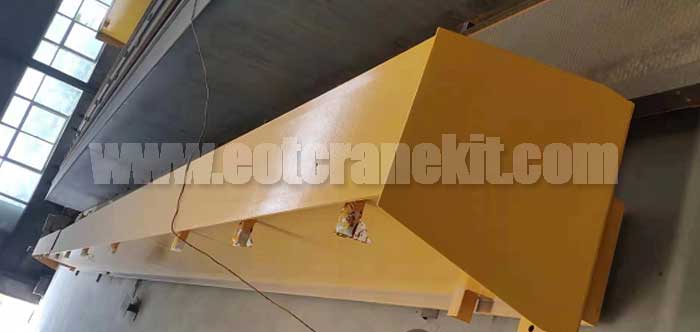
6.3 ton overhead crane kit for sale Philippines, complete single girder top running overhead crane system, low headroom design for workshop indoor use.
Free consultation to Confirm Parameters & Specifications and Get
Latest Crane Price & Crane Rate.
- Types of overhead cranes : _______?
- Optional: Overhead travelling crane, goliath gantry crane,Slewing jib crane, Single girder or double girder crane,small portable crane or kbk crane, etc.
- Capacity of overhead crane: _______?
- Optional: 0.25ton, 0.5 ton, 1 ton, 2 ton, 3ton, 5 ton, 10 ton,15ton, 20ton, 25 ton, 30ton,35ton, up to 550ton, etc.
- Crane span & lifting height : _______?
- Crane travelling length : _____?
- Control of overhead crane:_______?
- Optional: pendant/ remote/cabin control
- Voltage supply of overhead crane:_____?
- Eg,: 380V50/60HZ,3Phase or others,etc.
- Application/usage of crane:_______?
- Eg,: Steel mill, ,injection mold, cement,stone, concrete,granite, general manufacturing, etc.
Just leave a message via the contact form and our hoist and crane engineer will contact you with in 24working hours.
Get In Touch
